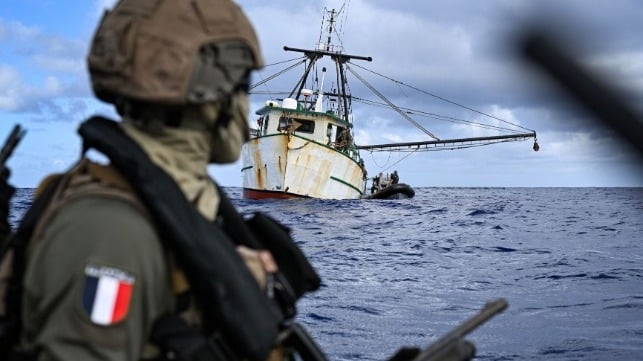France's Navy Seizes 10 Tonnes of Cocaine Off West Africa

France's navy has completed a major cocaine bust in the trafficking lanes off the coast of West Africa, an increasingly important transshipment region for the drug supply chain from South America to Europe.
Following a tip-off from British authorities and other international partners, two vessels of the Marine Nationale intercepted a stateless fishing vessel in the Gulf of Guinea, where France maintains a standing naval mission. Upon boarding, the interdiction team found 9.6 tonnes concealed aboard the vessel, a consignment valued at about $600 million if delivered to its final destination.
"The seamless cooperation between national and international actors in the fight against narcotics made this remarkable seizure possible. This event further illustrates the effectiveness of the French government's action at sea in protecting external borders," France's Maritime Prefect of the Atlantic said in a statement.
Le 22.09, sous la direction du @premar_ceclant et du procureur de #Brest @justice_gouv, la @MarineNationale déployée en mission CORYMBE a procédé à la saisie de 9.6 tonnes de cocaïne au large de l'Afrique de l'ouest.
— Préfecture maritime et commandement en chef ATLANT (@premar_ceclant) September 25, 2025
?? https://t.co/Q2Uwuvfq9F pic.twitter.com/fJwSn4kBkJ
The bust was unusually large, but far from unusual in other respects. The service said that 54 tonnes of drugs have been seized in the area since the start of 2025.
Balkan gangs reportedly dominate the "Highway 10" transatlantic trade lane along the 10th parallel, working in partnership with upstream cocaine suppliers like Brazil's PCC gang and midstream logistics brokers on the ground in Senegal, Sierra Leone, Gambia, Guinea-Bissau and Cabo Verde.
"Operations by Western Balkan criminal networks have contributed to making West Africa a pivotal EU-bound cocaine transshipment node – and the region continues to grow in importance for the global cocaine trade," said researcher Lucia Bird in a new report by the Global Initiative Against Transnational Organized Crime.
The drugs arrive from South America largely by non-containerized means (small workboats and yachts), sometimes transshipped to other craft at sea. On arrival on shore in Africa, the drug is forwarded to the European market in containerized shipments, packed and dispatched in "legitimate" boxes by West African front companies, according to Bird and her colleagues. Very little of the costly drug is sold to West African consumers, though the local market for crack and powder cocaine is growing.

that matters most
Get the latest maritime news delivered to your inbox daily.
As elsewhere, illicit smuggling activity in the region fuels official corruption at seaports and government agencies, the researchers found. Gang personnel fleeing the criminal justice system in Europe may also be finding a new safe haven in West Africa, where they can avoid extradition, the report suggested.
Latin American cocaine production has soared and spread since the mid-2010s, increasing supply and suppressing kilo prices at the source. Complementing this supply-side push factor, cocaine demand has skyrocketed in Europe, according to InsightCrime, creating a pull factor for transatlantic shipping.
